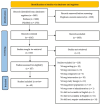Strain-Specific Therapeutic Potential of Lactiplantibacillus plantarum: A Systematic Scoping Review
- PMID: 40218922
- PMCID: PMC11990516
- DOI: 10.3390/nu17071165
Strain-Specific Therapeutic Potential of Lactiplantibacillus plantarum: A Systematic Scoping Review
Abstract
Objectives: This systematically scoping review aims to evaluate the therapeutic potential and clinical benefits of specific Lactiplantibacillus plantarum (L. plantarum) strains in human health, identifying their strain-specific effects across various medical conditions. Methods: Following the PRISMA for Scoping Reviews (PRISMA-ScR) guidelines and employing the PICO framework, a comprehensive literature search was conducted in the PubMed and Embase databases to identify relevant studies published up to December 2023. Inclusion criteria were rigorously applied to ensure the selection of high-quality studies focusing on the clinical application of distinct L. plantarum stains. Results: This review analyzed several unique strains of L. plantarum across 69 studies, identifying several therapeutic benefits. L. plantarum 299v effectively improved gastrointestinal symptoms, enhanced oral health, and reduced systemic inflammation. L. plantarum IS-10506 exhibited notable immunomodulatory effects, especially in managing atopic dermatitis. L. plantarum LB931 showed promise in decreasing pathogenic colonization, supporting women's vaginal health. Additionally, L. plantarum CCFM8724 demonstrated potential in reducing early childhood caries, highlighting its promise in pediatric oral care. Conclusions: The therapeutic potential of L. plantarum is extensive, with certain strains exhibiting promising clinical benefits for specific health concerns. The findings of this review advocate for the integration of L. plantarum strains into clinical practice, emphasizing the need for further research to elucidate their mechanisms of action, optimal dosages, and long-term safety profiles.
Keywords: Lactiplantibacillus plantarum; gut microbiome; human clinical trials; immunomodulation; probiotics; strain-specific effects.
Conflict of interest statement
The authors declare no conflicts of interest.
Figures
Similar articles
-
Reducing severity of inflammatory bowel disease through colonization of Lactiplantibacillus plantarum and its extracellular vesicles release.J Nanobiotechnology. 2025 Mar 20;23(1):227. doi: 10.1186/s12951-025-03280-7. J Nanobiotechnology. 2025. PMID: 40114208 Free PMC article.
-
Preventive and Therapeutic Effects of Lactiplantibacillus plantarum HD02 and MD159 through Mast Cell Degranulation Inhibition in Mouse Models of Atopic Dermatitis.Nutrients. 2024 Sep 6;16(17):3021. doi: 10.3390/nu16173021. Nutrients. 2024. PMID: 39275335 Free PMC article.
-
Inhibitory Effect of Lactobacillus plantarum CCFM8724 towards Streptococcus mutans- and Candida albicans-Induced Caries in Rats.Oxid Med Cell Longev. 2020 Dec 19;2020:4345804. doi: 10.1155/2020/4345804. eCollection 2020. Oxid Med Cell Longev. 2020. PMID: 33414892 Free PMC article.
-
Lactiplantibacillus plantarum 299v (LP299V®): three decades of research.Benef Microbes. 2021 Oct 11;12(5):441-465. doi: 10.3920/BM2020.0191. Epub 2021 Aug 9. Benef Microbes. 2021. PMID: 34365915 Review.
-
Lactiplantibacillus Plantarum as a Complementary Approach for Diabetes Treatment and Management.Curr Nutr Rep. 2025 May 28;14(1):72. doi: 10.1007/s13668-025-00664-x. Curr Nutr Rep. 2025. PMID: 40434575 Review.
References
-
- Hill C., Guarner F., Reid G., Gibson G.R., Merenstein D.J., Pot B., Morelli L., Canani R.B., Flint H.J., Salminen S., et al. The International Scientific Association for Probiotics and Prebiotics consensus statement on the scope and appropriate use of the term probiotic. Nat. Rev. Gastroenterol. Hepatol. 2014;11:506–514. doi: 10.1038/nrgastro.2014.66. - DOI - PubMed
-
- Yilmaz B., Bangar S.P., Echegaray N., Suri S., Tomasevic I., Manuel Lorenzo J., Melekoglu E., Rocha J.M., Ozogul F. The Impacts of Lactiplantibacillus plantarum on the Functional Properties of Fermented Foods: A Review of Current Knowledge. Microorganisms. 2022;10:826. doi: 10.3390/microorganisms10040826. - DOI - PMC - PubMed
Publication types
MeSH terms
Grants and funding
LinkOut - more resources
Full Text Sources
Medical



